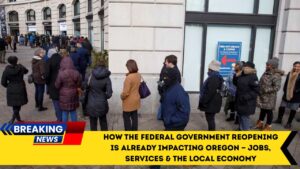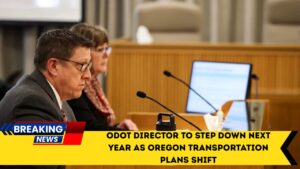On Friday, Tina Kotek officially signed the emergency transportation package — House Bill 3991 — into law, marking a significant shift in how Oregon will fund its roads, bridges and transit systems.
The package is billed as an urgent fix to a looming budget shortfall at the Oregon Department of Transportation (ODOT) and aims to raise approximately $4.3 billion over the next decade.
The law includes major increases to the gas tax, registration and title fees, and introduces a road-usage charge for electric vehicles (EVs).
Why the emergency package was needed
Oregon faced a serious funding gap and risked major cuts to transit service, highway maintenance and even employee layoffs.
With dwindling gas tax revenues (partly due to increased fuel efficiency and more electric vehicles) the state needed a new revenue plan. Under the new law, these are the crucial targets:
- Prevent layoffs of essential transportation staff by ODOT and transit agencies.
- Maintain safe state highways, local roads, and critical bridges.
- Protect winter-maintenance operations, snow clearing, and contributor services in more remote regions.
- Create a funding mix that reflects both drivers of traditional vehicles and EV owners — ensuring “everyone using the roads pays their share”.
Governor Kotek called the legislation “essential” for keeping Oregon moving and avoiding disruption.
What the new law changes — numbers & details
Here are the key provisions of the law including tax increases and new fees:
Major changes in HB 3991
| Revenue Source | Change | Effect / Impact |
|---|---|---|
| Gas tax | From $0.40 to $0.46 per gallon | +6 ¢ per gallon for gasoline vehicles. |
| Vehicle registration fee | Increase from current fee (varies) to a higher amount starting Dec 31, 2025 | Drivers pay more to register; initial increase approx $42 for passenger vehicles. |
| Vehicle title fee | Raised from around $77 to about $216 for passenger vehicles (starting Dec 31) | Large jump in title fees when buying or transferring vehicles. |
| Electric vehicle road usage charge (RUC) | Mandatory charge: 2.3 ¢ per mile or optional flat annual fee of $340 for EVs | EV drivers pay either per-mile or flat fee to use roads. |
| Payroll tax (for transit) | Increase of 0.1% (from 0.1% to 0.2%) of paycheck for two years for transit funding | On a $68,000 salary, about $136/year extra. |
| First-decade target | Raises approx $4.3 billion over ten years | Funds road and bridge maintenance, operations, transit services. |
How and when the changes will take effect
- The bill was passed by the legislature on Sept. 29, 2025, in a special session.
- Governor Kotek signed it on Nov. 7, 2025 (public-release Nov 10).
- Most fee increases (gas tax, registration fee, title fee) take effect Dec. 31, 2025.
- The EV usage charge begins its phase-in over the next few years, giving EV owners time to adjust.
- The payroll transit tax increase kicks in immediately for applicable years.
- A referendum process may start: opponents have until Dec 30 to gather signatures to refer parts (primarily tax increases) to voters for Nov 2026 ballot-decision.
What this means for drivers, transit riders and EV owners
- Drivers of gasoline vehicles will see slightly higher fuel cost (+6 ¢/gallon) and higher registration/title fees.
- Electric vehicle owners will face either higher annual fee ($340) or pay per-mile at 2.3 ¢/mile; this moves the cost burden from only fuel tax payers to non-fuel payers too.
- Transit passengers may benefit from preserved services that were at risk of cuts: bus routes, light-rail, snow-clearing for roads are protected.
- Local agencies (cities, counties) have relief in maintenance budgets; this helps rural roads and bridges.
- Taxpayers will be asked to pay a shared portion to keep the system afloat; some debate remains about whether this shifts burdens unfairly.
Political and public reaction
The law sparked strong reactions:
- Some Republicans accused Governor Kotek of delaying the signature to limit voter-referendum time and increase chances of acceptance.
- Transit agencies, AAA, counties and cities generally supported the bill as necessary to avoid service collapse.
- The upcoming referendum effort (collecting ~78,000 signatures) targets the gas tax, vehicle fee hikes and payroll tax — suggesting a major campaign ahead.
The signing of the emergency transportation package by Governor Tina Kotek marks a pivotal moment for Oregon’s roads, transit systems and vehicle fees.
With $4.3 billion expected over the next decade, major changes are set in motion: gas tax up, EV usage charges, registration/title fee hikes and a stronger revenue base for maintenance and transit.
While the law addresses urgent funding shortfalls, drivers and EV owners will feel the impact, and the political battle—with a potential voter referendum—has only just begun.
Stay informed, review how it affects you, and plan for higher costs if you’re registering a vehicle or buying an EV in Oregon.




